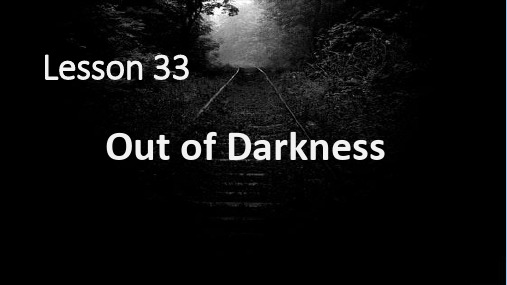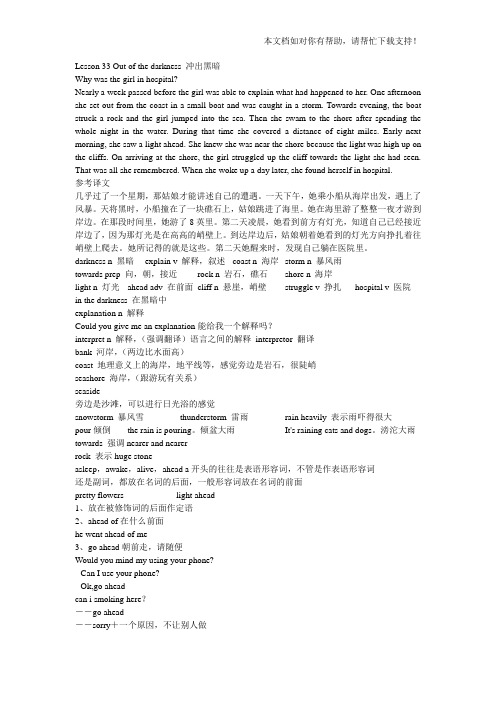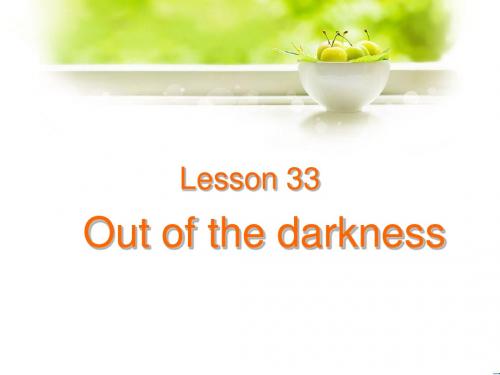新概念英语第二册第33课-Out of the darkness
新概念英语第二册听力及翻译Lesson33

Lesson 33 Out of the darkness 冲出⿊暗First listen and then answer the question.听录⾳,然后回答以下问题。
Why was the girl in hospital?Nearly a week passed before the girl was able to explain what had happened to her. One afternoon she set out from the coast in a small boat and was caught in a storm. Towards evening, the boat struck a rock and the girl jumped into the sea. Then she swam to the shore after spending the whole night in the water. During that time she covered a distance of eight miles. Early next morning, she saw a light ahead. She knew she was near the shore because the light was high up on the cliffs. On arriving at the shore, the girl struggled up the cliff towards the light she had seen. That was all she remembered. When she woke up a day later, she found herself in hospital.New words and expressions ⽣词和短语darkness n.⿊暗shore n.海岸explain v. 解释,叙述light n. 灯光coast n.海岸ahead adv. 在前⾯storm n.暴风⾬cliff n.峭壁towards prep. 向,朝;接近struggle v.挣扎rock n.岩⽯,礁⽯hospital n. 医院Notes on the text 课⽂注释1 set out,出发,动⾝。
新概念英语第二册Lesson+33Out+of+the+darkness方位介词课件

_____n_e_a_r______ the gentleman
next to/ by/ beside/ close to 在附近:near
Prepositions of Place
____b_e_tw__ee_n_____ them 在...中间
between:在两者中间
_____a_m_o_n_g_____ them among:在三者或三者以上的中间
穿过 across:穿过...表面 through:穿过内部 路过:past
at & towards 朝,向…
A ball came towards him. towards 距离上越来越近
He threw a stone at me.
at 含有瞄准之意
It is rude to point at people.
Prepositions of Place
______i_n_______ the tree ______o_n_______ the tree
在树上 in:人或其他东西在树上 on:枝叶果实长在树上
Prepositions of Place
swim___a_c_r_o_ss___ the pool walk ___th_r_o_u_g_h__ the tunnel walk ____p_a_s_t ___ you
他一到北京就给妈妈打电话。 As soon as he arrived in Beijing, he called his mother.
On arriving in Beijing, he called his mother. Tip:如果是两个不同的主语,则不能用“on(介 词)+doing”的结构来简化句子。
新概念2-第33课

be caught in a storm 遭遇暴风雨 be caught in the rain 淋雨
After a storm comes a calm. /ka:m/ (谚)雨过天晴,否极泰来。
5. towards prep. 向,朝;接近
❤ 下了公车,他向着他的公司走去。 After getting off the bus, he walked towards his company.
dark + ness = darkness 黑暗,阴郁 good + ness = goodness 善良,美德,仁慈 careful + ness = carefulness 仔细,慎重 happy + ness = happiness 幸福
2. explain vt. & vi. 说明,阐明;解释,辩解
状语从句,as soon as=the moment后面要加句子. • on 后面一定要加动词ing, 承认动词是由主句主语做的
eg.on arriving home,it began to rain. (错误)两个不同的主语,不能用on+动名词
• up the cliff towards the用两个介词起到动词的作用,up在此处为介词,
set out to do 开始,着手做某事
(2) be caught in表示某人“(突然)遇到/上(风暴等)”
•他在回家途中遇到了大雨。 He was caught in a heavy rain on the way home.
3. Towards evening, the boat struck a rock and the girl jumped into the sea. Then she swam to the shore after spending the whole night in the water.
新概念英语二 nce2-lesson33

۞Then she swam to the shore after spending the whole night in d a distance of eight miles. ▲that time指上句话中的the whole night.
Words and phrases
1. nearly adv. :almost 几乎,将近 nearly a week 将近一星期 2. pass vt. ① 通过: pass the exams ② 递 : pass sb. sth. past prep. 超过 eg: 5:30:half past five 3. ahead adv. 在前面 go ahead 随意,自便 eg: May I smoke here? Go ahead!
· On arriving at the shore , the girl struggled up the cliff towards the light she had seen.---定语从句
Words and phrases
12. all 后面的定语从句,关系代词只能用that, 不能用which eg: · All ( that ) you can do is to wait. · That was all (that) she remembered.
Exercise
二、选词填空 1. I saw David in the street the _____ day and the next day other he gave me a call. (next /other) 2. We arrived in Tokyo on Friday. The ______ next day we had an important meeting. (other /next) 3. We all_______ passed in the mid-exam last Sunday. (past/passed) Other 4. Some students are playing football. _____ students are singing. (other/next) 5. There were a lot of people sunbathing on beach the _____ .(shore/beach) past 6. Tom walked _____ without greeting. (past /passed)
新概念英语第二册Lesson33

1.Nearly a week passed before the girl was able to explain what had happened to her. He passed my house this morning. Past? past不是动词,它可以用作介词、形容词、副词和名词: He walked past my house. (介词) He told me about his past experience. (形容词) He seems似乎 to live in the past. (名词) be able to and Can can表示总的能力或客观存在的能力,而be able to 表示的是特定 的、具体的能力,强调不仅具备了某种能力,而且还实际做到了 或将会做到。 He could walk forty miles a day in the past. (具备这种能力,但不一定实际去做。) He was able to walk forty miles a day last year. (不仅具有这种能力,而且实际做了。) We will be able to finish the work next month. You might be able to persuade him. [pə‘sweɪd] 说服
♂ coast n. 海岸 She set out from a coast. 他从海岸出发 辨析: coast 邻近海的比较宽阔或狭长的地域 We live on the coast shore湖或者海的边缘或水边的狭长陆地,比coast 范围小 She swam to the shore. beach(shore的倾斜部分)往往在涨潮时候被漫 过 The little beach hotel has a pleasant environment.
新概念第二册lesson3334课文详解

Lesson 33 Out of the darkness 冲出黑暗Why was the girl in hospital?Nearly a week passed before the girl was able to explain what had happened to her. One afternoon she set out from the coast in a small boat and was caught in a storm. Towards evening, the boat struck a rock and the girl jumped into the sea. Then she swam to the shore after spending the whole night in the water. During that time she covered a distance of eight miles. Early next morning, she saw a light ahead. She knew she was near the shore because the light was high up on the cliffs. On arriving at the shore, the girl struggled up the cliff towards the light she had seen. That was all she remembered. When she woke up a day later, she found herself in hospital.参考译文几乎过了一个星期,那姑娘才能讲述自己的遭遇。
一天下午,她乘小船从海岸出发,遇上了风暴。
天将黑时,小船撞在了一块礁石上,姑娘跳进了海里。
她在海里游了整整一夜才游到岸边。
新概念英语第二册lesson33

cultural background
the darkness :指小船触礁的夜晚 指姑娘失指去知觉
Out of the darkness: 指冲出黑暗 指恢复知
觉、脱离危险
Exercise
一、根据句意和汉语提示用适当形式填空 1.Could you finish your workah_e_a_d____of time?(在前面) 2.We are very tired, because we havec_o_v_e_r_e_d_ 30-mile a
悬崖,峭壁
6. early next morning 第二天凌晨 early in the morning 一大早
7. towards evening
傍晚时分
Words and phrases
8. set out from 从……出发, 动身 9. be caught in 遇上,赶上
be caught in a storm 遇上暴风雪 eg: I was caught in a traffic jam
day he
gave me a call. (next o/tohtehrer)
2. an
We
arrived
in
Tokyo
on
Friday.
The n_e_x_t___
day
we
had
importapnatssmeedeting. (other /next) 3. We all_______ in the mid-exam lasOtthSeurnday. (past/passed)
equal
rights.
A. against
B. for
C. with
新概念英语第二册第33课(共27张PPT)

6. Early next morning, she saw a light ahead. She knew she was near the shore because the light was high up on the cliffs.
第二天凌晨,他看见前方有灯光,知道自己已经接近 岸边了,因为那灯光是高高的峭壁。
刚听到这个消息,她就晕了过去。 On hearing the news, she fainted.
= When she heard the news, she faint . 刚到家,天就开始下雨了。 On arriving home, it began to rain. When she arrived home,it began to rain. 如果是两个不同的主语,则不能使用 “on + 动名词”的结构
to protect the earth. • 在电影里,人类与外星人做斗争来保护地球。 • struggle for = fight for 为……而斗争 • In America, the black people are always
struggling for their equal rights. • 在美国,黑人总是为他们的平等权利做斗争。
• --Can I smoke here? • --Go ahead. /Sorry, you’d better not.
• struggle n. v. 斗争,挣扎 • She struggled up the cliffs. 她挣扎着爬上峭壁
• struggle against 与…作斗争 • In the film, human struggle against the aliens
- 1、下载文档前请自行甄别文档内容的完整性,平台不提供额外的编辑、内容补充、找答案等附加服务。
- 2、"仅部分预览"的文档,不可在线预览部分如存在完整性等问题,可反馈申请退款(可完整预览的文档不适用该条件!)。
- 3、如文档侵犯您的权益,请联系客服反馈,我们会尽快为您处理(人工客服工作时间:9:00-18:30)。
CaptainAlisonwillsetoutateighto'clock.
艾利森船长将于8点钟启航。
setoutfrom表示“从……出发”。
(2)becaughtin表示某人“(突然)遇到/上(风暴等)”:
Hewascaughtinaheavyrainonthewayhome.
这架飞机从莫斯科飞往纽约。
Hewenttowardstheshopquickly.
他快速地向商店走去。
Hewentforhome.
他回家了。
Heleft/setoutforNewYorkyesterday.
他昨天动身去纽约了。
(3)表示“进去”、“出来”这两种方向的介词为into和outof;表示“在某个地方”或“在……里面/外面”可用at,in,outof等;表示目的地或位置往往用at:
新概念英语第二册第33课:Out of the darkness
听录音,然后回答以下问题。
Whywasthegirlinhospital?
Nearlyaweekpassedbeforethegirlwasabletoexplainwhathadhappenedtoher.
几乎过了一个星期,那姑娘才能叙述自己的遭受。
(1)这句话有两个从句。before始终到结尾是句子的时间状语从句。在这个从句中,explain又有自己的宾语从句,what为这个从句的主语。
(2)before在引导时间状语从句时,有时不肯定译为“在……之前”,虽然表达的是这个意思,如文中的这句话。类似的情况有:
Itwillbemonthsbeforehecancomeback.
这只鸟用3分钟飞完了全程。
(3)表示详细的距离可以用“adistanceof+详细长度”这个结构。
5.highuponthecliffs,在高高的峭壁上。
up为形容词,表示“在上面的”、“高高的”、“在较高处的”,high为副词,修饰up。
6.Onarrivingattheshore,thegirlstruggleduptheclifftowardsthelightshehadseen.
4.Duringthattimeshecoveredadistanceofeightmiles.在那段时间里,她游了8英里。
(1)thattime指上句话中提到的thewholenight。
(2)cover可以笼统地表示“行过(一段路程)”,依据上下文可详细译为“走过”、“飞过”、“游过”等:
Thebirdcoveredthedistanceinthreeminutes.
SeeyounextFriday.
下个星期五再见。
Maryphonedthenextdaytotellusthatshecouldn'tcometotheparty.
第2天玛丽打来电话告诉我们她不能来参与晚会了。
theotherday指时间时可以有afewdaysago的意思:
MaryphonedtheotherdaytotellusthatshehadarrivedinLondon.
第二天凌晨,她看到前方有灯光,知道自己已经接近岸边了,因为那灯光是在高高的峭壁上。
Onarrivingattheshore,thegirlstruggleduptheclifftowardsthelightshehadseen.
到达岸边后,姑娘朝着她看到的灯光方向挣扎着往峭壁上爬去。
Thatwasallsheremembered.Whenshewokeupadaylater,shefoundherselfinhospital.
她所记得的就是这些。第二天她醒来时,发觉自己躺在医院里。
NewwordsandExpressions生词和短语
darkness
n.黑暗
east
n.海岸
storm
n.暴风雨
towards
prep.朝,向,接近
rock
n.岩石
shore
n.海岸
light
n.灯光
ahead
adv.在前面
cliff
n.峭壁
struggle
v.挣扎
hospital
n.医院
Lesson33自学导读Firstthingsfirst课文详注Furthernotesonthetext
1.Nearlyaweekpassedbeforethegirlwasabletoexplainwhathadhappenedtoher.几乎过了一个星期,那姑娘才能叙述自己的遭受。
要过好几个月他才能回来。
Heranoffbeforehismothercouldstophim.
他母亲还没来得及阻挡他,他就跑掉了。
2.Oneafternoonshesetoutfromthecoastinasmallboatandwascaughtinastorm.一天下午,她乘小船从海岸出发,遇上了风暴。
到达岸边后,姑娘朝着她看到的灯光方向挣扎着往峭壁上爬去。
(1)“on+动名词”相当于assoonas或when引导的时间状语从句:
Onreachingtheairport,hewasarrestedbythepolice.
他一到机场就被警察逮捕了。
(2)shehadseen为thelight的定语从句,关系代词that/which省略了。
Youpassedmewithoutevennoticingme!
你从我身边经过时居然没留意到我!
Yoursisterpassedmeinhernewcar,drivingatgreatspeed.
你姐姐/妹妹开着她的新车从我身旁驶过,开得特别快。
I'vepassed/pastmyFrenchtest.
Thensheswamtotheshoreafterspendingthewholenightinthewater.
她在海里游了整整一夜才游到岸边。
Duringthattimeshecoveredadistanceofeightmiles.
在那段时间里,她游了8英里。
Earlynextmorning,shesawalightahead.Sheknewshewasneartheshorebecausethelightwashighuponthecliffs.
星期天我们到达乡下。(范围大时用in)
Wearrivedatthestationintheevening.
晚上我们到达车站。(范围小时用at)
(4)表示“穿过”、“越过”、“绕过”等动作时,往往用through,across,under,over,round等介词:
Howdidyougetthroughthefence?
我法语考试通过了。
Amonthhaspassed/pastsinceIlefthome.
我离开家已一个月了。
(2)past可以作形容词、介词、名词等。作形容词时表示“以前的”、“过去的”等:
Manythingshappenedinthepostweek.
过去的这一周内发生了许多事。
Frankisproudofhispastexperiences.
(3)up在此处为介词,表示“沿着……往上”。
7.Thatwasallsheremembered.她所记得的就是这些。
that指前面(从第2句话开始)描述的内容。sheremembered为all的定语从句,关系代词that(不能用which)被省略了。
语法Grammarinuse
用于表示方向和目的地的介词和副词(也被称为小品词)
您能给我讲讲您过去的一些事吗?
Inthepast,weusedtogatherundertheTownHallclocktowelcometheNewYear.
我们过去常聚集在市政厅的大钟下面迎新年。
2.next与other
next表示时间挨次上“紧接的”、“下一个”。假如以现在为基准,则next前一般不加the;假如以过去或将来的某一时间为基准,则next前面要加the或其他修饰词:
前几天玛丽来电话告诉我们她已到达伦敦。
(2)表示“来”、“去”的一对小品词是from和to;towards的意义与to相近,表示“朝”、“向”、“接近”等;for在有些动词后面也表示“往”、“向”的.意思:
HecamefromMoscow.He'sgoingtoNewYork.
他从莫斯科来。
他将要去纽约。
TheplanefliesfromMoscowtoNewYork.
你怎么穿过篱笆的?
Iclimbedover/underit.
我是爬/钻过去的。
词汇学习Wordstudy
1.pass与past
(1)动词pass的过去式为passed,过去分词为passed或past。当它作及物动词用时,可以表示“经过”、“通过(考试)”或“超过”等,作不及物动词用时可以表示“(时间等)消逝”:
他在回家途中遇到了大雨。
3.Thensheswamtotheshoreafterspendingthewholenightinthewater.她在海里游了整整一夜才游到岸边。
介词after的宾语是动名词spending及这个动名词的宾语、状语,这个结构在意义上等于aftershehadspentthewholenightinthewater。
Whendidyoucomeintotherestaurant?
你什么时候进的餐馆?
Youweren'tintherestaurantwhenIcomein.
我进来的时候你不在餐馆。
Weranoutofthehouse.
我们从屋里跑了出来。
WearrivedinthecountryonSunday.
